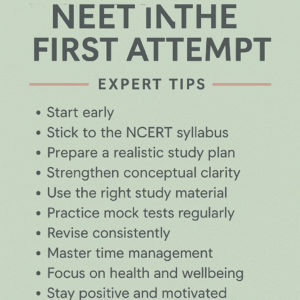Starting NEET preparation in Class 11 is a smart move that gives you ample time to build a strong foundation and increase your chances of success in one of the most competitive medical entrance exams in India. The two years between Class 11 and NEET can be a game-changer if used wisely. This comprehensive guide will walk you through everything you need to know to begin your NEET journey in Class 11, including tips, subject-wise strategies, daily routines, and FAQs.
Why Start NEET Preparation in Class 11?
Starting early offers several advantages:
Solid Conceptual Foundation: Class 11 syllabus forms a major part of the NEET syllabus.
Less Stress Later: Spreading the preparation over two years reduces last-minute pressure.
Time for Practice: Early start means more time for mock tests and revisions.
Smart Time Management: Balancing school studies with NEET becomes easier.
Understanding the NEET Exam Pattern
Before you begin, it’s important to understand the structure of NEET:
Subjects: Physics, Chemistry, Biology (Botany + Zoology)
Total Questions: 200 (180 to be attempted)
Total Marks: 720
Duration: 3 hours 20 minutes
Marking Scheme: +4 for correct, -1 for incorrect answers
Step-by-Step Guide to Start NEET Preparation in Class 11
1. Understand the Syllabus
NEET syllabus is based on the NCERT syllabus of Class 11 and 12. Start by comparing NEET topics with your school syllabus.
Biology: Focus on NCERT line by line.
Chemistry & Physics: Conceptual clarity is key; practice problems regularly.
2. Build a Study Plan
Create a timetable that balances both school studies and NEET preparation:
Daily Plan: Minimum 6–7 hours of focused study (including school time)
Weekly Targets: Set short goals like completing a chapter or mastering a topic.
Monthly Review: Assess your progress and adjust your plan accordingly.
3. Follow NCERT Books Rigorously
NCERT books are the backbone of NEET preparation, especially for Biology. For Physics and Chemistry, start with NCERT and then refer to standard reference books.
Recommended Books:
Biology: NCERT, Trueman’s Biology
Chemistry: NCERT, O.P. Tandon, Physical Chemistry by N Awasthi
Physics: NCERT, H.C. Verma, D.C. Pandey series
4. Focus on Conceptual Clarity
Avoid rote learning. Understand the “why” and “how” behind every concept. Especially in Physics, conceptual clarity is essential to solving numerical problems.
5. Practice Regularly
MCQs: Solve chapter-wise NEET-style questions.
Previous Year Papers: Understand the pattern and frequently asked topics.
Mock Tests: Begin with one test per month and gradually increase frequency.
6. Revise Consistently
Make revision a regular part of your study routine.
Daily Revision: Spend 30–45 minutes revising previous topics.
Weekly Revision: Go over all topics covered during the week.
Notes & Flashcards: Create quick revision material for formulas and key facts.
7. Enroll in a Coaching Program (Optional)
If self-study isn’t enough or if you need guidance:
Online Coaching Platforms: Affordable and flexible (e.g., Aakash Live, Unacademy, PW)
Offline Coaching Institutes: Ideal if you prefer classroom learning
Choose what suits your learning style and schedule.
8. Stay Healthy and Motivated
Sleep: 6–8 hours of proper sleep is essential.
Exercise: Regular physical activity helps maintain concentration.
Avoid Burnout: Take breaks, meditate, or engage in hobbies to recharge.
Subject-Wise Strategy
Biology:
Stick to NCERT. Every word is important.
Practice diagrams and labeling.
Make short notes and flowcharts for processes.
Chemistry:
Physical: Practice numericals regularly.
Organic: Focus on mechanisms and reaction sequences.
Inorganic: Memorize NCERT content thoroughly.
Physics:
Understand derivations and laws.
Solve numerical problems daily.
Use visual aids and simulations for better understanding.
Tips for Class 11 Students Preparing for NEET
Start slow but be consistent.
Don’t aim for perfection in one go; improvement comes with time.
Join study groups or peer discussions.
Don’t ignore school exams—they help reinforce concepts.
Take help from mentors or seniors who have cracked NEET.
Sample Daily Study Routine
| Time | Activity |
|---|---|
| 6:00 AM | Wake up and light exercise |
| 6:30 – 7:30 AM | Revise previous day’s topics |
| 8:00 – 2:00 PM | School hours |
| 3:00 – 5:00 PM | Study NEET Physics/Chemistry |
| 5:00 – 6:00 PM | Break / Snack / Light activity |
| 6:00 – 8:00 PM | Study Biology / Solve MCQs |
| 8:00 – 9:00 PM | Dinner + Break |
| 9:00 – 10:00 PM | Revision / Mock test practice |
| 10:30 PM | Sleep |
FAQs – How to Start NEET Preparation in Class 11
Q1. Is Class 11 too early to start NEET preparation?
A: No, it is the ideal time. It helps build a strong foundation and reduces pressure in Class 12.
Q2. How much time should I devote daily for NEET prep in Class 11?
A: Start with 3–4 hours outside school hours. Increase gradually as per your comfort.
Q3. Is coaching necessary for NEET?
A: Not compulsory, but helpful. Many students crack NEET through disciplined self-study.
Q4. Can I prepare for NEET and do well in school exams simultaneously?
A: Yes. NEET and board exams share a common syllabus (NCERT), so integrated preparation is possible.
Q5. Which subject should I focus on more in Class 11?
A: All are equally important, but Biology should get more attention as it carries the highest weightage.
Conclusion
Starting NEET preparation in Class 11 gives you a competitive edge and allows you to master the syllabus without unnecessary stress. Follow a structured plan, focus on NCERT, practice consistently, and maintain your health. Remember, discipline and consistency matter more than long study hours.










